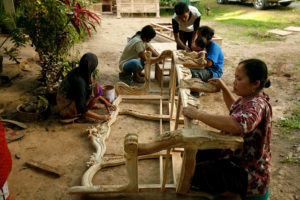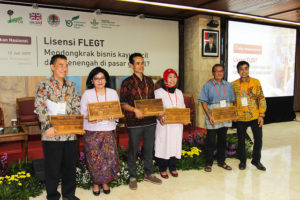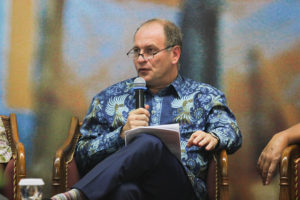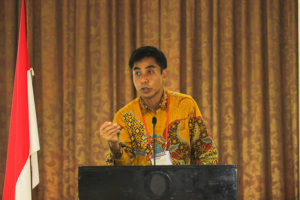
Forest Law Enforcement, Governance and Trade (FLEGT) licensing is like an anak sholeh — a good and pious child — according to several speakers at a recent national policy dialogue held in Jakarta, Indonesia.
From forests to workshops, marketplaces and homes, Indonesia’s timber products form a long and complex supply chain, which FLEGT is helping to regulate and strengthen.
The country’s timber exports are valued at US$11 billion annually. Thanks to its timber legality verification system known as SVLK and the subsequent issuance of FLEGT, with which businesses can export timber and wood products to the European Union with greater ease, the government expects furniture exports to increase significantly.
Indonesia is the only country in the world to have implemented the licensing so far, giving its furniture a competitive advantage in an increasingly discerning market as consumers pay more attention to the issues of a green environment, illegal logging, deforestation and sustainable production.
Watch: Policy dialogue: CIFOR cohosts FLEGT talks in Jakarta

However, issues remain in the widespread implementation of FLEGT in Indonesia, especially among small and medium enterprises (SMEs).
The recent policy dialogue, cohosted by the Center for International Forestry Research (CIFOR) and supported by the CGIAR Research Program on Forests, Trees and Agroforestry (FTA) on July 13, tackled the topic of FLEGT licensing and supporting SMEs to access global markets.
The dialogue brought together scientists, government representatives, local furniture producers and community leaders to discuss challenges for SMEs to meet FLEGT requirements; a strategy to maximize the impacts of the license on SMEs; and the role of province and district governments to ensure the legality of SME production.
Read more: Indonesia’s timber going green – and global
Ida Bagus Putera Parthama, Director General of Sustainable Forest Management at Indonesia’s Forestry and Environment Ministry, said the initiative stemmed from an effort to eliminate illegal logging, and a desire to “stop the stigma attached to Indonesia about illegal wood.”
He described the license as “a good boy that the whole country has been waiting for” and said “everyone should support it.”
“The final outcome we expect from the system is to increase our market share, competitiveness of products, revenue for communities and in the end improve the livelihoods of those involved,” Parthama explained.

Charles-Michel Geurts, deputy head of the EU Delegation to Indonesia and Brunei, concurred. “The world is looking to Indonesia,” he said. “Anak sholeh is a role model; everybody likes him [and] wants to adopt him.”
However, some business people voiced concerns. Jepara Small-Scale Furniture Producers Association (APKJ) representative Sulthon Muhamad Amin said that while medium and large companies may not be lumbered with the requirements, the costs associated with the licensing were too onerous for small-scale workshops. Thus, some still preferred to partner with exporters in the local market rather than become exporters themselves.
Sulthon later said small businesses must change this mindset. However, he questioned how this could happen, stating that many small-scale businesses had never heard of FLEGT.
Despite dissemination efforts, local administrations must be more proactive in providing assistance to small businesses, Sulthon said. “If an SME is like a small boy being led by a mother, it doesn’t mean he can be given the information and then left alone.”
Read more: Brexit rattles Indonesia’s timber trade prospects with Europe

FTA scientist Herry Purnomo of CIFOR, whose work looks at furniture value chains, said SLVK promoted a balance between economic progress and environmental conservation. The system was not only driven by the EU’s system, he explained, as advancing people’s economies through participation and in an environmentally friendly manner was also mandated by the country’s Constitution.
In line with this, sustainable value chains and investments to support forest conservation and equitable development are a key part of FTA’s work.
Purnomo also echoed Sulthon’s thoughts, saying small-scale businesses faced different issues to big companies. Thus, local administrations should be more active in maximizing the benefits of FLEGT licenses for SMEs.
“We should also think about the domestic market, not only about the EU market,” Purnomo added. “Maybe we need to use SVLK more in domestic procurement processes.”
Taking note of Indonesia’s status as the first country to have FLEGT licenses, the scientist said environmental awareness would continue to grow, including in other emerging markets across the region such as Korea and Singapore. “Later it will be very difficult for us to catch up.”
For business people, exporters and consumers, FLEGT is a new kid on the block worth getting to know.
By Hannah Maddison-Harris, FTA Communications and Editorial Coordinator.
Related publications
- Strength in numbers: Java’s furniture makers go green and increase incomes
- Synthesis: Action research to improve furniture value chain governance and enhance livelihoods of small-scale producers
This work forms part of the CGIAR Research Program on Forests, Trees and Agroforestry (FTA). We would like to thank all donors who supported this work through their contributions to the CGIAR Fund.











